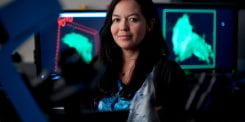Study shows how to prevent a high-fat diet from throwing metabolism out of whack
UCI biologists discover removing a protein inhibitor restores metabolic balance

Irvine, Calif., April 5, 2023 — Eating lots of fats increases the risk of metabolic disorders, but the mechanisms behind the problem have not been well understood. Now, University of California, Irvine biologists have made a key finding about how to ward off harmful effects caused by a high-fat diet. Their study appears in Nature Communications.
The UC Irvine research centered on a protein complex called AMPK, which senses the body’s nutrition and takes action to keep it balanced. For example, if AMPK detects that glucose is low, it can boost lipid breakdown to produce energy in its place. Scientists have known that consuming high amounts of fat blocks AMPK’s activity, leading the metabolism to go out of balance. However, until now, how cells block this mechanism has not been widely examined, especially in live models.
The UCI biologists decided to investigate, believing an AMPK component called SAPS3 serves a significant role. They eliminated SAPS3 from the genome of a group of mice and fed them meals with a 45 percent fat content. The results were startling even to the research team.
“Removing the SAPS3-inhibiting component freed the AMPK in these mice to activate, allowing them to maintain a normal energy balance despite eating a large amount of fat,” said Mei Kong, professor of molecular biology & biochemistry and the study’s corresponding author. “We were surprised by how well they maintained normal weight, avoiding obesity and development of diabetes.”
The discovery could eventually lead to a new way to approach metabolism-related conditions. “If we block this inhibition activity, we could help people reactivate their AMPK,” said first author Ying Yang, a project scientist in the Kong lab. “It could help in overcoming disorders such as obesity, diabetes, fatty liver disease and others. It’s important to recognize how important normal metabolic function is for every aspect of the body.”
The researchers are working on developing molecules that could inhibit SAPS3 and restore the metabolism’s balance. They plan to next study SAPS3’s role in other conditions with disturbed metabolic systems, such as cancer and aging.
The discovery comes as metabolic-related diseases such as obesity and diabetes continue to rise. More than half of the global population is expected to be overweight or obese by 2035, compared to 38 percent in 2020, according to the World Obesity Federation. The number of people worldwide with diabetes is expected to rise to 578 million by 2030, up 25 percent from 2019, reports the National Center for Biotechnology Information.
Support for the project was provided by the National Institutes of Health and the American Cancer Society.
About UCI’s Brilliant Future campaign: Publicly launched on Oct. 4, 2019, the Brilliant Future campaign aims to raise awareness and support for UCI. By engaging 75,000 alumni and garnering $2 billion in philanthropic investment, UCI seeks to reach new heights of excellence in student success, health and wellness, research and more. The School of Biological Sciences plays a vital role in the success of the campaign. Learn more by visiting https://brilliantfuture.uci.edu/school-of-biological-sciences/.
About the University of California, Irvine: Founded in 1965, UCI is a member of the prestigious Association of American Universities and is ranked among the nation’s top 10 public universities by U.S. News & World Report. The campus has produced five Nobel laureates and is known for its academic achievement, premier research, innovation and anteater mascot. Led by Chancellor Howard Gillman, UCI has more than 36,000 students and offers 224 degree programs. It’s located in one of the world’s safest and most economically vibrant communities and is Orange County’s second-largest employer, contributing $7 billion annually to the local economy and $8 billion statewide. For more on UCI, visit www.uci.edu.
Media access: Radio programs/stations may, for a fee, use an on-campus ISDN line to interview UCI faculty and experts, subject to availability and university approval. For more UCI news, visit news.uci.edu. Additional resources for journalists may be found at communications.uci.edu/for-journalists.

